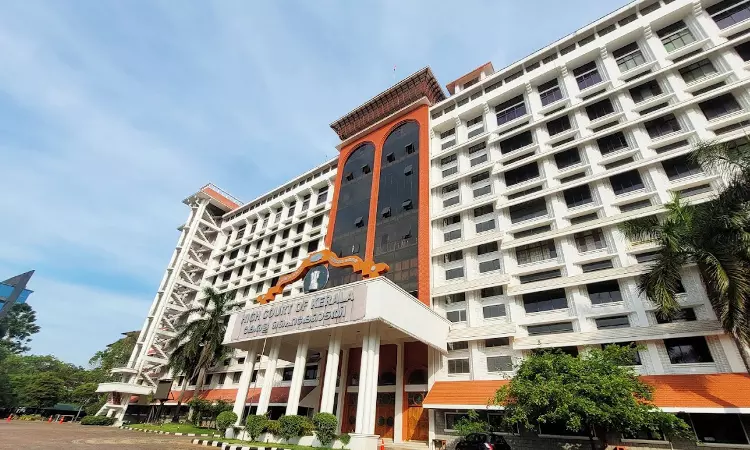- Home
- /
- High Courts
- /
- Kerala High Court
- /
- Kerala High Court Grants 15 Days...
Kerala High Court Grants 15 Days Parole To Mohammed Nisham Who Was Convicted For Running Over A Security Guard
Manju Elsa Isac
9 April 2025 10:20 AM IST
The Kerala High Court has granted 15 days parole to Mohammed Nisham who was convicted in a 2015 case of killing a security guard by running over him. The Division Bench comprising Justice Raja Vijayaraghavan V. and Justice P. V. Balakrishnan granted the leave in an appeal filed by Nisham's wife taking into account the favourable report given by the probationer officer. The Court held that...
The Kerala High Court has granted 15 days parole to Mohammed Nisham who was convicted in a 2015 case of killing a security guard by running over him.
The Division Bench comprising Justice Raja Vijayaraghavan V. and Justice P. V. Balakrishnan granted the leave in an appeal filed by Nisham's wife taking into account the favourable report given by the probationer officer. The Court held that the convict was entitled to parole under Kerala Prison and Correctional Services (Management) Rule, 2014.
The Court while allowing the appeal held that even prisoner should be able to be free, even if it for a short period.
“It must be remembered that a convict, literally speaking, is to remain in prison for the entire period of his sentence or, in the case of a life convict, for the rest of his natural life. It is in this solemn context that parole must be seen as a temporary reprieve – an opportunity not only to address personal or familial obligations but also to maintain essential social ties. Even those undergoing imprisonment must be allowed to breathe the air of freedom, albeit briefly, provided they have exhibited consistently good conduct during incarceration and demonstrated a genuine inclination towards reformation and integration.”
Mohammed Nisham a business man who was engaged in tobacco sale and real estate was convicted for mowing down the security guard, Chandrabose for delaying in opening the gate. The accused was sentence to life imprisonment by the District Court which was later confirmed by the High Court.
The State had denied the parole owing to an adverse police report. In the report it was stated that the convict had disputes concerning property and business with his siblings and releasing him may cause a law-and order situation. The Government Pleader opposing the appeal submitted before the Court that the convict was transferred from Thavanur jail to the Viyyur jail due to his misbehaviour towards jail officers and for possessing prohibited substances. Pursuant to this, a minor punishment of forfeiture of remission for upto 15 days was imposed upon him. It was submitted that the convict has anger issues and his release can cause a law-and-order situation.
However, the appellant informed the Court that arbitration proceedings are underway to settle the issues between the siblings. The appellant further informed the Court that pursuant to his conviction in 2015, he has been out of jail only for a total period of a little over 3 months by way of bail and leave.
As per Rule 397 of Kerala Prison and Correctional Services (Management) Rule, 2014, a prisoner with good character who has undergone one-third of the punishment or 2 years, whichever is less is entitled to leave of 60 days in a year and the leave period at a time cannot be less than 15 days or more than 30 days. The Court held that the convict is entitled to be considered for parole as per the Rule. The Court said that the favourable report of the probationary officer has to be given due weight as it is an independent and professional assessment of the facts and circumstances.
Further, the Court observed that since the convict has already initiated arbitration proceedings to settle the property disputes between the siblings, he need not take law into his own hands to take any advantage. The Court observed that it was the responsibility of the law enforcement authority to ensure that no law-and-order situation arises. The Court said that the authorities can strictly monitor the situation and impose any condition on the convict to make sure that no untoward incident happens while he is on parole.
Scope Of Judicial Review Of Order Granting Parole
The Court said that when the enactments say that parole can be granted on the ground of sufficient cause, adequacy and sufficiency of the reason for granting or refusing parole comes under the purview of judicial review. The Court added that it can see if the order of rejection is founded on relevant, valid and legally sustainable ground or if it's based on extraneous, malafide or irrelevant reasons. However, the Court added that court's intervention is warranted only in cases where the decision is demonstrably arbitrary, unreasonable or unsupported by material evidence.
Counsel for the Appellant: Advocates Bejoy Joseph P. J., M. Ramesh Chander (Sr.), Govind G. Nair, Balu Tom, Bonny Benny
Counsel for the Respondents: Adv. C. K. Suresh (Spl. GP)
Case No: WA 553/ 2025
Case Title: Amal Nisham v The State of Kerala and Another
Citation: 2025 LiveLaw (Ker) 231
Click Here To Read/ Download Order

